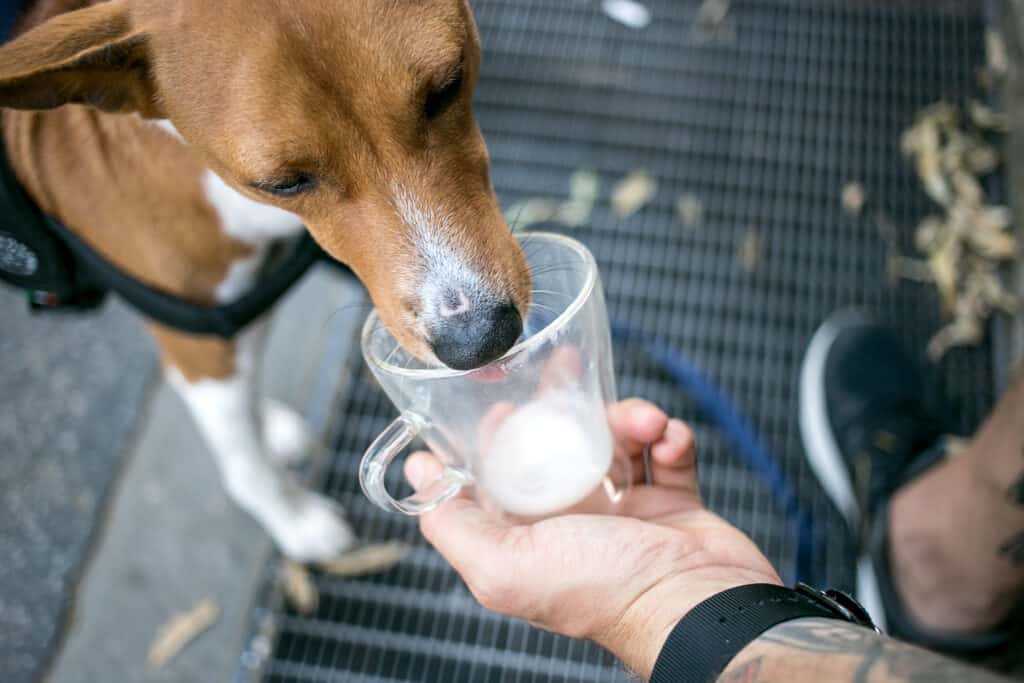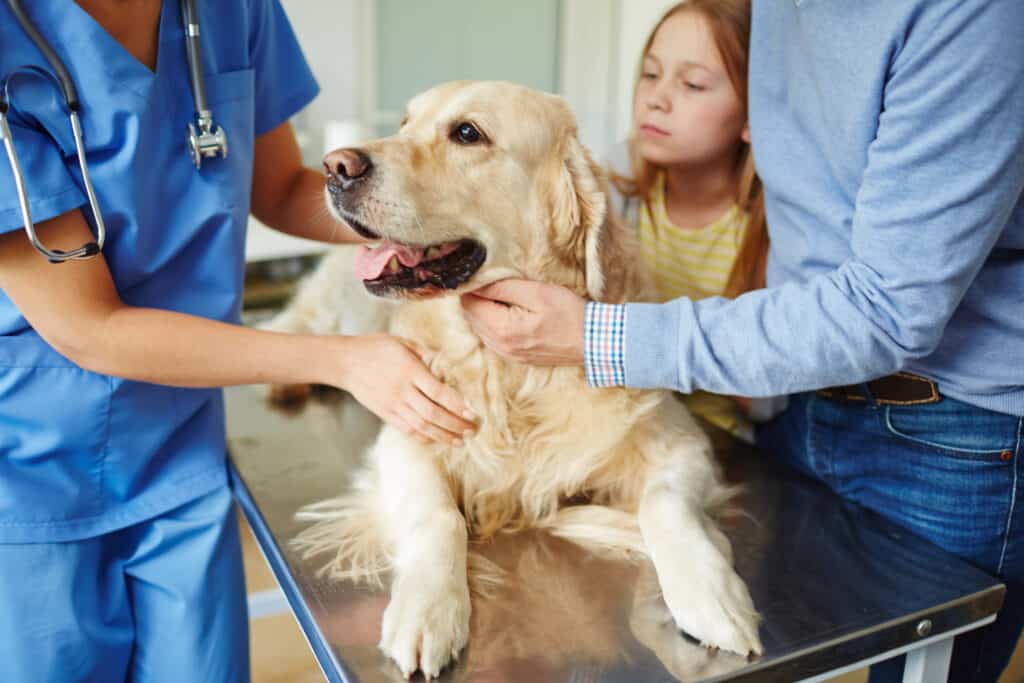Tea for dogs is a bit of a complicated subject, as there are many different teas. One tea may contain completely different ingredients than another one. Therefore, it is hard to judge whether or not tea is safe for dogs.
However, we generally don’t recommend tea for dogs. Most types of tea are toxic for one reason or another. Therefore, it isn’t recommended that your dog consume any tea.
Still, that doesn’t mean your dog will develop severe toxicity from a sip of tea. Most teas are only toxic in very high amounts. Luckily, most dogs don’t drink this much tea. However, you still shouldn’t offer it or tempt fate. Very old, very young, and sick dogs may be more prone to issues than others.
When in doubt, we always recommend calling your vet. They know your pet best and can consider the specifics of your situation. Different types of tea are extremely different, so speaking with a professional is often recommended.
Why Is Tea Bad for Dogs?

Whatever was in this cup before the dog started licking it likely wasn’t tea, because tea is not safe for dogs, for a variety of reasons. Keep your dog away from all types of tea.
©BublikHaus/Shutterstock.com
Tea isn’t safe for dogs for several different reasons. We recommend that your dog avoid all types of tea, though different teas are toxic for different reasons.
Dairy
Many teas are prepared with dairy. Milk and creamer may lead to an upset stomach for your pet, though. While dairy doesn’t upset all dogs, many dogs are lactose intolerant. Therefore, they may develop stomach cramps and diarrhea after consuming significant amounts of dairy.
Of course, if you don’t put dairy in your tea, this isn’t a problem.
Sugar
Many teas include sugar. Even if you don’t add sugar, the tea may have sugar due to dried fruit or other ingredients used to brew it. A little bit of sugar is okay for your dog. It is not toxic. However, many dogs have trouble being overweight or obese, which is linked to many serious health problems. Sugar can add empty calories that your dog doesn’t need.
Sugar can also lead to increases in blood sugar levels. Over time, this may lead to diabetes and other health issues. One lick of sugar won’t cause harm, but long-term consumption will.
Many sugar alternatives are toxic to dogs. For instance, xylitol is very toxic in even low amounts and requires quick veterinary treatment. Therefore, it should be avoided as a sugar alternative in anything your dog eats.
We don’t recommend switching out the sugar for one of these alternatives. Often, the risks can be higher. Many teas may also contain an artificial sweetener in their ingredient.
Caffeine

Caffeine from all sources is toxic to dogs.
©Javier Brosch/Shutterstock.com
One way that tea is toxic is due to its caffeine content. Too much caffeine can lead to caffeine toxicity, which is very serious for dogs. It can cause hyperactivity, vomiting, diarrhea, heart issues, and elevated blood pressure. These need to be treated by a vet. More severe signs like seizures and even coma can occur.
If your dog drinks caffeine-containing tea, you should call your vet or the pet poison hotline. Have information about the type of tea and amount ready, if possible, as this will help the person on the other end determine if your pet needs attention.
Of course, not all teas include caffeine. Many are safe for dogs, in theory. However, freshwater is always the safer and healthier option.
How Much Tea Is Toxic to Dogs?
How much tea your dog can drink depends mainly on the type of tea, their size, and their health. Some dogs may be more susceptible to caffeine than others, making even a tiny amount of tea a lousy idea. Black teas often contain much more caffeine than others, while herbal teas contain very little.
Dogs with kidney issues may be less able to filter out caffeine. Not only will this make the caffeine more toxic to them, but it can also cause further kidney damage.
There are many different factors to consider when your dog consumes tea. Therefore, asking a professional if you have any doubts is essential.
We recommend checking the ingredients and caffeine content if your dog consumes tea. Have this information available if you call your vet or the pet poison helpline.
Can Dogs Have Black Tea?
Black tea isn’t recommended for any dog, as it is often high in caffeine. Technically, it would take quite a bit of black tea for your dog to develop caffeine toxicity. However, organ damage can develop before clinical signs of caffeine toxicity do. Therefore, your dog’s liver, kidney, heart, and brain may be damaged by caffeine even if the dog looks and acts fine.
There is no reason to give your dog black tea, either. While there are some health benefits for humans, the caffeine content shadows any potential benefit for dogs. Freshwater is always the safest option.
What Should I Do If My Dog Drank Tea?

If your dog managed to drink some tea, mark the contents and caffeine of the tea, when they drank it, and how much. If you’re in doubt, or if the tea has caffeine or toxic ingredients, call your vet.
©Aleksey Boyko/Shutterstock.com
If your dog drinks tea, we recommend checking the contents and caffeine content and noting them down. We also recommend tracking the time your dog consumed the tea and how much. An estimate is okay. However, an ounce of tea is very different from 40 ounces of tea.
Note down any information you have, including potential symptoms.
Your dog is likely fine if the tea doesn’t include caffeine or any toxic ingredients. You may want to call your vet anyway, especially if your dog is young, old, or sick.
If the tea does contain a toxic ingredient, we recommend calling your vet or the pet poison helpline. With the provided information, a professional should be able to determine if your dog needs to see a vet.
What To Do If My Dog Ate a Tea Bag?

Regardless of the type of tea, if your dog eats a tea bag, take him or her to the vet.
©iStock.com/shironosov
If your dog ate a tea bag, we recommend a vet trip – no matter the tea. While your dog is, of course, going to digest the tea in the bag, the actual bag will also pose a risk. The bag could become trapped in your dog’s intestines, causing an impaction. Impactions do not fix themselves on their own and can be extremely serious. Without treatment, most dogs will die.
Therefore, you should visit your vet right away. We recommend writing down information about the tea itself, too, as your vet may need to treat your dog for caffeine toxicity and other disorders.
Because tea bags can threaten your dog in many ways, the prognosis isn’t as good as when a dog only consumes tea. There will be many problems for your vet to be content with, potentially. However, dogs treated quickly often have a better chance of recovering fully.
Dogs with existing organ problems may be more likely to develop negative symptoms. Tea can damage your dog’s liver, kidneys, and heart. Therefore, your dog may be in more serious trouble if these organs are already damaged.
Smaller dogs are also more at risk for complications. Not only will the caffeine affect them more, but the bag is more likely to become impacted. Therefore, you should absolutely get smaller dogs to the vet right away. Larger dogs may not be affected quite as much, though veterinary care is still recommended.
Can Tea Cause Seizures in Dogs?
Tea can cause some seizures in dogs if it contains caffeine. Because tea isn’t that caffeinated, it usually doesn’t cause seizures. Instead, caffeine pills and chocolate are more likely to cause caffeine toxicity. Still, that doesn’t mean you should let your dog consume as much tea as possible.
If your dog does consume caffeinated tea in high amounts, we recommend visiting your vet. Smaller dogs and sick dogs are more prone to issues.
Conclusion
Dogs cannot consume tea, as it contains caffeine and potentially other toxins. Not all tea is necessarily toxic, but much of it is. Therefore, we recommend avoiding all types of tea, as you can never be too careful. If your dog consumes a lot of tea, you should contact your vet or the pet poison control helpline.
When in doubt, calling your vet is always the best option.
Up Next…
- What Foods Can Dogs Eat Safely, and Which Are Dangerous?
- What Can Dogs Drink Besides Water?
- Can Dogs Eat Spicy Food Safely? What Happens If They Do?
The photo featured at the top of this post is © Aleksey Boyko/Shutterstock.com
Ready to discover the top 10 cutest dog breeds in the entire world?
How about the fastest dogs, the largest dogs and those that are -- quite frankly -- just the kindest dogs on the planet? Each day, AZ Animals sends out lists just like this to our thousands of email subscribers. And the best part? It's FREE. Join today by entering your email below.
Thank you for reading! Have some feedback for us? Contact the AZ Animals editorial team.






